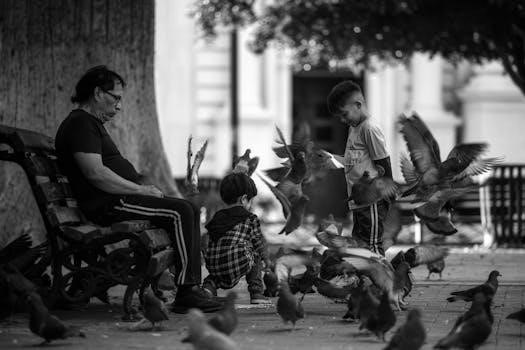Overview of The Brothers Karamazov
The Brothers Karamazov, Fyodor Dostoevsky’s last novel, explores the complex dynamics of the Karamazov family. It centers on Fyodor Pavlovich Karamazov and his three sons⁚ Dmitri, Ivan, and Alyosha. The plot revolves around their intricate relationships and the consequences of their actions. The novel delves into themes of morality, faith, and free will in 19th-century Russia.
Author and Publication
The Brothers Karamazov was penned by the renowned Russian author, Fyodor Dostoevsky; This literary masterpiece represents his final and arguably greatest work. Dostoevsky dedicated nearly two years to crafting this complex novel, which was initially serialized in The Russian Messenger from January 1879 to November 1880. The complete novel was then published in 1880. Dostoevsky’s exploration of profound theological and philosophical themes, including the nature of evil, freedom, and faith, is evident in this compelling story. Set in 19th-century Russia, it provides a vivid depiction of the social and spiritual landscape of the time. The book, often considered a theological drama, examines faith, doubt, and reason within a rapidly modernizing society. Its impact on subsequent generations of readers and writers remains profound. Dostoevsky’s narrative style, characterized by passionate and authentic human emotion, is showcased in this sprawling, thought-provoking exploration of family dynamics and moral dilemmas. The novel’s intricate plot and memorable characters have solidified its place in literary history, continuing to be studied and revered for its depth and insight into the human condition.
Main Characters⁚ The Karamazov Brothers
The novel centers around the three legitimate sons of Fyodor Pavlovich Karamazov, each possessing distinct personalities and viewpoints. Dmitri, the eldest, is portrayed as passionate and impulsive, often driven by his emotions and entangled in a love triangle. His volatile nature leads to his eventual implication in their father’s murder. Ivan, the middle son, is an intellectual and skeptic, grappling with profound philosophical questions about the existence of God and morality. His rational mind and struggle with faith are central to the novel’s themes. Alyosha, the youngest, serves as a stark contrast to his brothers. He is a novice monk, characterized by his pure heart and spiritual quest. His role is to provide a moral compass within the narrative, offering a different perspective on the family’s conflicts. These three brothers, along with their complex relationships, drive the plot and explore the novel’s central themes. Each brother is allocated significant narrative importance, ensuring the reader views the story through their individual perspectives. The characters’ differing worldviews and responses to the unfolding events make them unforgettable figures in literary history.

Plot Summary
The plot revolves around the dysfunctional Karamazov family and the murder of their father, Fyodor. The sons, Dmitri, Ivan, and Alyosha, each grapple with their complex relationships with their father and one another as the narrative unfolds amid love, hate, and moral dilemmas.
Patricide and its Aftermath
The core of the narrative is the murder of Fyodor Karamazov, the patriarch, a despicable figure whose life was marked by greed and debauchery. The immediate aftermath of his death thrusts the brothers into a whirlwind of suspicion and accusations. Dmitri, the eldest, becomes the prime suspect due to his volatile nature and public conflicts with his father, particularly over financial matters and a shared love interest. This accusation sets the stage for a legal and moral battle that exposes the hidden depths of the characters. The investigation and subsequent trial, however, are not just about determining the murderer, but also exploring the moral culpability of each brother, and the collective responsibility for their father’s demise. The event acts as a catalyst, bringing to the surface long-standing resentments, unacknowledged guilt, and the complex psychological interplay within the family. The aftermath of the patricide forces each brother to confront their own demons and to reflect on their values and beliefs in a world where the lines between good and evil are blurred. The consequences extend beyond the immediate family, impacting the entire town and revealing the fragility of human nature.
Themes Explored in the Novel
The Brothers Karamazov delves into a rich tapestry of profound themes, central to the human experience. The novel grapples with the eternal conflict between faith and doubt, embodied in Ivan’s intellectual skepticism and Alyosha’s unwavering spirituality. Free will and moral responsibility are also key, explored through the characters’ choices and their consequences. The complexities of human nature are laid bare as the brothers struggle with their inner desires, flaws, and the capacity for both good and evil. Family dynamics, particularly the destructive impact of a dysfunctional father, play a significant role, highlighting how upbringing shapes individual destinies. The search for meaning and purpose in a seemingly chaotic world is another central theme, with each brother seeking answers through different paths, whether through passion, intellect, or faith. Dostoevsky also examines the nature of justice and redemption, questioning the effectiveness of earthly laws and the possibility of spiritual salvation. The novel also touches upon the social and political climate of 19th-century Russia, reflecting the tensions between tradition and modernity, and the impact on individuals’ lives.

Key Aspects
Key aspects of the novel include the philosophical debate within “The Grand Inquisitor,” the role of Alyosha as a central figure, and the powerful influence of family dynamics on the characters’ lives and actions, all contributing to the novel’s enduring relevance.
The Significance of “The Grand Inquisitor”

“The Grand Inquisitor” is a pivotal chapter within The Brothers Karamazov, presenting a profound philosophical debate about human freedom, faith, and the nature of authority. It’s a story within the story, narrated by Ivan Karamazov to his brother Alyosha, where Christ returns to Earth during the Spanish Inquisition. The Grand Inquisitor, a powerful figure, confronts Christ, arguing that humanity is not capable of handling the burden of freedom and that the Church provides the necessary structure and control. He accuses Christ of giving humans too much free will, which leads to suffering and chaos. The Inquisitor believes that providing miracles, mystery, and authority is the only way to truly make people happy, even if it means sacrificing their freedom. This chapter is crucial as it encapsulates many of the novel’s central themes and challenges traditional religious views. It explores the tension between individual liberty and societal control, questioning the very foundations of faith and power. The narrative leaves the reader to ponder the complex relationship between religious dogma and the fundamental human desire for freedom and happiness; It serves as a vital point of philosophical inquiry, prompting reflection on the essence of human existence and spirituality.
Alyosha as the Central Figure
Alyosha Karamazov, the youngest of the brothers, is often considered the moral compass of the novel, though Dostoevsky himself stated him to be the hero. Unlike his passionate and intellectual brothers, Alyosha is characterized by his gentle nature, deep faith, and unwavering compassion. He serves as a novice monk, seeking spiritual guidance from Father Zossima. Alyosha’s presence in the narrative is crucial because he embodies a contrasting perspective to the cynical and conflicted views of his family. He represents the possibility of goodness and redemption in a world consumed by moral decay and suffering. Although he is not directly involved in the central plot of the murder, his interactions with other characters, particularly his brothers, provide insight into their internal struggles. Alyosha’s role is to offer empathy and understanding, acting as a mediator and a source of hope. His spiritual journey forms a parallel narrative to the larger family drama, exploring the themes of love, forgiveness, and the search for meaning. Through Alyosha, the novel explores the potential for spiritual transformation and the impact of faith on the human condition. He stands as a beacon of light, navigating the darkness of the Karamazov family’s existence.
The Role of Family Dynamics
Family dynamics are at the core of The Brothers Karamazov, shaping the characters and driving the plot. The dysfunctional relationship between Fyodor Pavlovich and his sons highlights the destructive impact of a flawed patriarch. The brothers, Dmitri, Ivan, and Alyosha, each grapple with their complex feelings towards their father, a man characterized by his debauchery and lack of parental care. Their interactions are fraught with tension, resentment, and a deep-seated longing for connection. Dmitri, the eldest, is impulsive and easily provoked, often clashing with his father over money and romantic interests. Ivan, the intellectual, is tormented by his philosophical doubts and his inability to reconcile reason with faith. Alyosha, the youngest, strives to find harmony amidst the chaos, seeking spiritual guidance and attempting to mediate between his brothers. The absence of a nurturing family environment has deeply scarred each brother, leading them to pursue different paths in life. The novel explores how these family relationships affect their choices, their beliefs, and their interactions with the world, ultimately contributing to the tragic events that unfold. The Karamazov family, as a whole, serves as a microcosm of the larger social and moral problems of 19th-century Russia.

